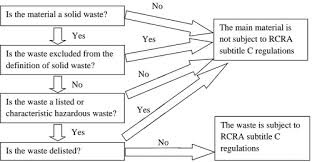Hazardous waste has long been a concern for environmentalists, policymakers, and the public alike. The mishandling of hazardous materials can have devastating effects on ecosystems, public health, and the overall well-being of communities. To address these concerns, governments around the world have implemented various regulations over the years aimed at managing and mitigating the risks associated with hazardous waste.
This article delves into the evolution of hazardous waste regulations, tracing their development from their inception to the present day and speculating on future trends in this critical area of environmental policy.
Past: Origins of Hazardous Waste Regulations
The history of hazardous waste regulation can be traced back to the mid-20th century when industrialization and technological advancements led to the widespread production of chemicals and other hazardous materials. As industrial processes became more complex, so too did the waste they generated. However, it wasn't until environmental disasters, such as the Love Canal incident in the United States in the 1970s, that the public and policymakers began to take notice of the dangers posed by hazardous waste.
In response to growing concerns, governments began to enact legislation aimed at controlling the generation, transportation, and disposal of hazardous waste. In the United States, the Resource Conservation and Recovery Act (RCRA) of 1976 represented a landmark piece of legislation that established a comprehensive framework for the management of hazardous waste. Similar regulations were implemented in other countries around the world, reflecting the global nature of the hazardous waste problem.
Present: Key Features of Hazardous Waste Regulations Today
Today, hazardous waste regulations are a complex web of laws, regulations, and guidelines that vary from country to country and even between regions within countries. However, there are several key features that are common to most regulatory regimes:
-
Classification of Hazardous Waste: Hazardous waste is typically classified based on its characteristics (e.g., ignitability, corrosivity, toxicity) and its source (e.g., industrial, household, medical). This classification helps determine how the waste should be handled, transported, and disposed of.
-
Permitting and Compliance: Facilities that generate, transport, or dispose of hazardous waste are often required to obtain permits from regulatory authorities. These permits outline the conditions under which the facility can operate and the measures it must take to ensure compliance with relevant regulations.
-
Waste Minimization and Recycling: Hazardous waste regulations increasingly emphasize waste minimization and recycling as means of reducing the overall volume of hazardous waste generated and conserving valuable resources. Many countries have implemented incentives and regulations to encourage businesses to adopt waste reduction and recycling practices.
-
Enforcement and Monitoring: Regulatory authorities are responsible for enforcing hazardous waste regulations and ensuring compliance by conducting inspections, issuing penalties for non-compliance, and monitoring the environmental impact of hazardous waste management activities.
-
International Cooperation: Given the global nature of the hazardous waste problem, international cooperation and coordination are essential for effective regulation. Initiatives such as the Basel Convention on the Control of Transboundary Movements of Hazardous Wastes and Their Disposal facilitate cooperation between countries in managing the transboundary movement of hazardous waste.
Future: Emerging Trends and Challenges
Looking ahead, several emerging trends and challenges are likely to shape the future of hazardous waste regulation:
-
Technological Innovation: Advances in technology, such as robotics, artificial intelligence, and remote sensing, have the potential to revolutionize hazardous waste management by making processes more efficient, safer, and environmentally friendly.
-
Circular Economy: The transition to a circular economy, in which resources are kept in use for as long as possible through recycling, reusing, and remanufacturing, is gaining traction as a way to reduce waste generation and promote sustainability. Hazardous waste regulations are likely to increasingly focus on promoting circular economy principles.
-
Climate Change: Climate change is expected to impact hazardous waste management in various ways, including increasing the frequency and intensity of extreme weather events, altering waste composition and generation patterns, and affecting the long-term stability of waste disposal facilities. Regulatory frameworks will need to adapt to these changing conditions to ensure the resilience of hazardous waste management systems.
-
Cross-Sectoral Collaboration: Addressing the complex challenges posed by hazardous waste requires collaboration across sectors and disciplines, including government, industry, academia, and civil society. Future regulations are likely to emphasize the importance of stakeholder engagement and cooperation in developing and implementing effective hazardous waste management strategies.
The evolution of hazardous waste regulations reflects society's growing recognition of the importance of protecting human health and the environment from the risks posed by hazardous waste. While significant progress has been made in recent decades, challenges remain, and the future of hazardous waste regulation will require continued innovation, collaboration, and adaptation to address emerging threats and opportunities. By working together, policymakers, businesses, and communities can build a more sustainable and resilient future for hazardous waste management.


No comments yet